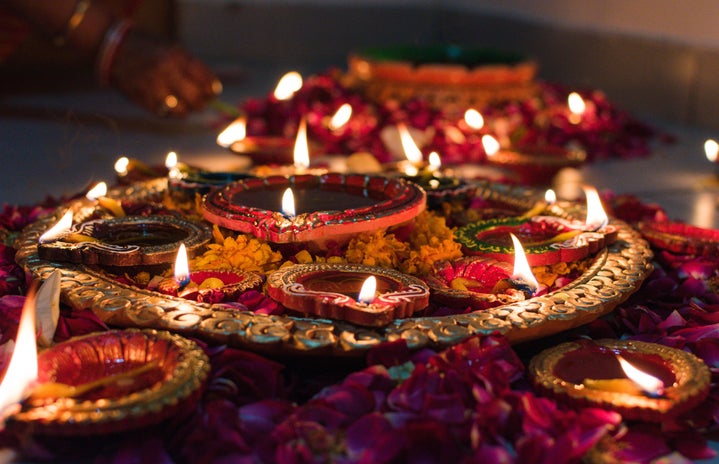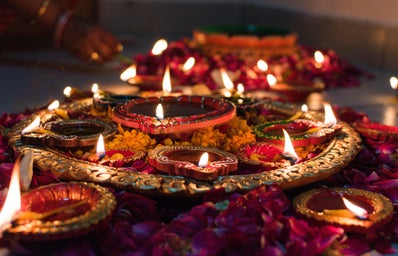As the fall semester continues, millions of people around the world are getting ready to celebrate Diwali, often known as the Festival of Lights. What is Diwali actually, though, and why does it hold such significance for its people celebrating? Together, Hindus, Sikhs, Jains, and Buddhists celebrate one of the most colorful holidays in the world. Let’s dive into the background of one of my favorite celebrations!
What is Diwali?
The five-day holiday of Diwali, also called Deepavali, represents the victory of good over evil and light over darkness. Despite its Hindu mythological origins, Diwali’s universal themes—hope, rebirth, family, and gratitude—resonate with people of many cultures.
How and when is Diwali observed?
The dates of Diwali vary every year due to the lunar calendar, although they often fall between October and November. The major event takes place on the third day of the five-day celebration. Every day has a special meaning:
Dhanteras, the first day of the holiday, is a time for arrangements, cleaning, and shopping. A lot of individuals purchase new kitchenware, gold, or silver as symbols of wealth and a new beginning. This year, it will be celebrated on October 29. Back at home, my family will gather by the mini temple in our home and immerse the gods with water and wash them all. Money is then added to the collection of the gods as an offering and food is made for them to have a meal.
The second day is Naraka Chaturdashi (Choti Diwali): To welcome good fortune, homes are cleaned and adorned with oil lamps (diyas) and rangoli, which are vibrant floor art creations. This year, this will be accomplished on October 30. Many people like to start early such as my family as we decorate the house colorfully and make sure to add tons of lights!
On the third day of Diwali, known as Lakshmi Puja (Diwali Night), families celebrate Lord Ganesha, the god of wisdom, and Goddess Lakshmi, the goddess of riches. Fireworks light the sky, and the brightness of diyas fills homes. My family on this day will go to the temple to get blessings and hope for a good time of hope and success.
The fourth day is Govardhan Puja: This day emphasizes protection and devotion while commemorating Krishna’s triumph over the thunderstorm deity Indra. My mom usually tells us stories about how this day came to be and why.
The fifth day is Bhai Beej: This day, which celebrates the relationship between brothers and sisters, marks the end of the festival. Siblings reaffirm their forever lasting relationship while exchanging gifts and food. On this day, the brothers usually go to the sisters house to celebrate.
The Reasons Diwali Is So Unique
Diwali is an opportunity to think, forgive, and begin again; it’s not merely a religious holiday. The reunion of family and friends symbolizes love and solidarity, while each glowing diya stands for hope and fortitude.
Diwali can be an opportunity for college students to re-establish ties with their families, culture, and even their spiritual side. It’s a chance to take stock of one’s accomplishments, no matter how modest, and spread that happiness to others.
Ideas for Campus Diwali Celebrations
There are numerous ways to celebrate Diwali and add a little brightness to your life, even if you live far from home:
Organize a Diwali party and invite friends, family nearby and roommates to join you. To build the scene, light diyas, tell tales about Diwali customs, and play Bollywood tunes! It would also be fun to dress up!
Create a Rangoli: At your door or in a public space, use some chalk, colored sand, or flower petals to create a rangoli. It is a method to honor the custom of decorating for success in addition to being an enjoyable hobby. Don’t do it alone and grab someone to get artistic with!
Make Traditional Foods: Indulge in some Diwali treats! Make some mithai (Indian sweets), such as jalebis, barfis, or laddoos. These sweets stand for joy, celebration, and sweetness. This can also be a way to show those who are not familiar with the festival sweets how to make them!
A Message for Everyone on Diwali
Diwali is basically a celebration of the global yearning for joy, harmony, and wealth. Regardless of whether you observe Diwali in a traditional manner, its message is universal. Take the chance to be kind to others, value your family, and discover joy in the small things.


